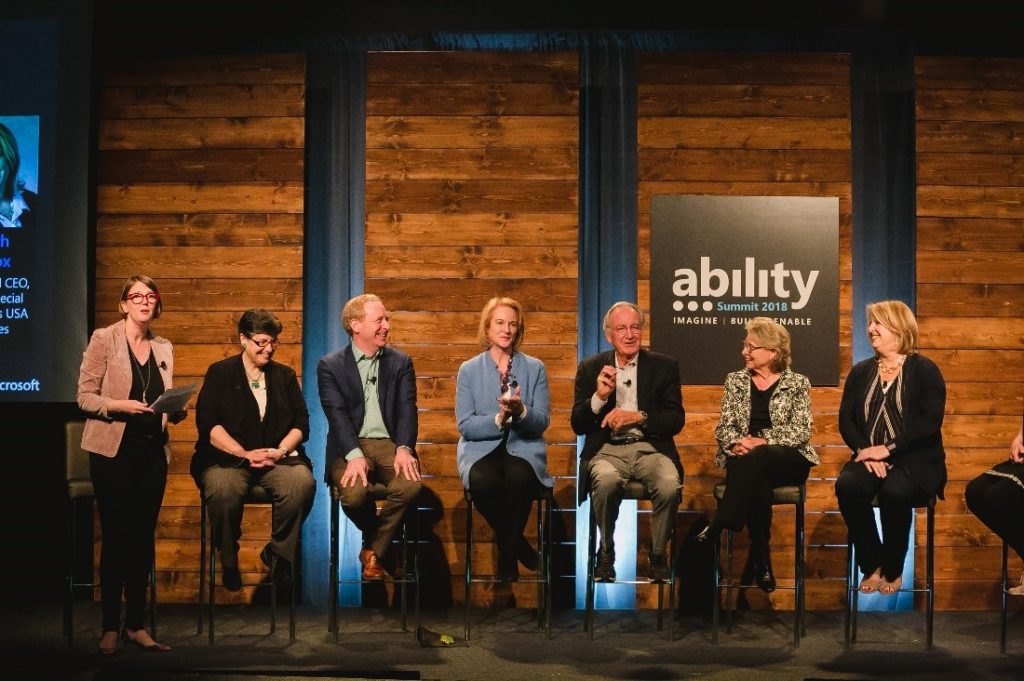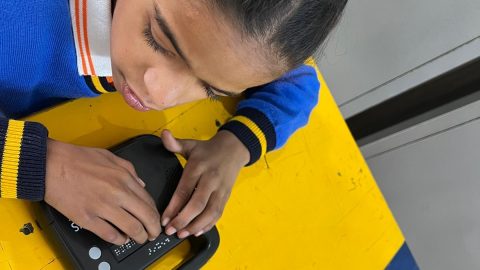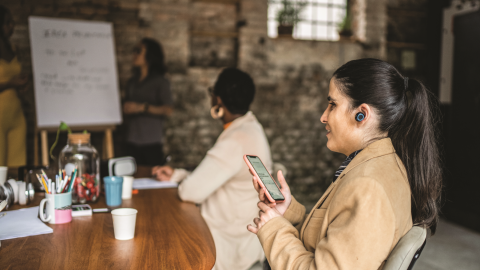ADA Anniversary: The Continued Importance of Inclusion
By Jenny Lay-Flurrie, Chief Accessibility Officer
On July 26 we will celebrate the 28th anniversary of the Americans with Disabilities Act (ADA). The ADA stands as one of the most important pieces of civil rights legislation and prohibits discrimination while ensuring that people with disabilities have the same opportunities and rights as people without disabilities. It serves as a reminder of both where we have come from as well as the work left to be done.
Since its inception, the ADA has helped break down barriers for people with disabilities in built environments, provision of government services, communications, and employment. Despite a lot of great progress, after nearly 3 decades there is still much to be done, not only to level the playing field, but also to recognize (and seek out!) talented people with disabilities, skills and expertise that we need in our companies. The unemployment rate for people with disabilities hasn’t materially shifted in that time and remains nearly double that of people without disabilities. We are one of the many employers that has the power to influence that number. We take that responsibility seriously. Here are three things we are doing to drive it:
Breaking Down Barriers Through Technology
It’s never been more important to have a diverse and inclusive workforce including people with disabilities. Put simply, it helps us create better products that empower people with disabilities. When accessibility is done well, it becomes invaluable to daily life, the workplace, and play. It’s ubiquitous and easy to use. These values guide us, and I urge you to check out the following:
- Accessibility built in by design. There is a wealth of goodness built into the core of our products – from Windows to Office and Xbox. Learning Tools, Dictate, Narrator, Translator, Color Blindness Filters, and more. We’ve created a simple one-stop-shop with our Accessibility Feature Sway which has every feature broken down by disability type and we update this and our new website www.microsoft.com/accessibility as new features become available. Do check it out and share!
- If in doubt, ask. Remember we have a dedicated support team for people with disabilities using Microsoft products, or using accessibility features. The Disability Answer Desk is there 24×7, via chat, phone and in the USA, a dedicated ASL video line. Now in 11 markets and ready to help you get going with your technology
- Your feedback is gold dust. We want to know what future you want, and technology you want to empower you. Tell us via our Accessibility UserVoice, Disability Answer Desk or tweet @MSFTEnable. Your feedback powers us.
- The power of innovation. AI is opening doors for innovation for people with disabilities. Invaluable tools like Seeing AI, Microsoft Translator, and Helpicto are built leveraging our vision, knowledge and speech Cognitive Services APIs and so we were excited earlier this year to announce the AI for Accessibility program to open up these technologies to you to create. The application process is now open, and first batch of grant applications are in mid review. Literally can’t wait to see what you come up with!
Creating Forums for Inclusion
It isn’t enough to just talk about inclusion, we need to partner together to drive impact. There are many events we host and attend where this happens, but two have highlighted the appetite for more:
- Microsoft Ability Summit. For the first time ever, we opened the doors to this internal event to the public and we were humbled by the results. Over the 8 years since we started the Ability Summit, attendance has grown from just 80 people in that first year, to 1,200 Microsoft employees, and 1,200 external guests over the two days. At the event, we demonstrated the latest in accessible technologies and attendees connected with the owners and drivers of those technologies. They also had the opportunity to engage with over 20 companies at an inclusive hiring job fair and heard from our very own CVP of Retail Stores, a panel of dignitaries and CEO Satya Nadella, who shared their thoughts on accessibility and disability. We were honored to include former Senator Tom Harkin who introduced the ADA into the Senate back in 1989 and underscored the need to break down barriers to get people with disabilities into the workforce. It’s our hope that by opening the event up more broadly we can share knowledge and accelerate the process for all organizations to build their programs, hire amazing talent, and reduce the unemployment rate.
- Disability:IN. Just last week in Las Vegas, 1,500 folks from over 160 corporate partners came together to discuss, share and take action on disability inclusion. Disability:IN (previously known as USBLN) is a corporate based NGO, Microsoft is a proud sponsor, and I’m a honoured to be chair of the board of directors. This organization has grown in numbers and strength in the past years and it speaks to the need, appetite and desire from so many companies to not only understand but drive the future of disability inclusion. During this event, over 130 rising leaders met with company leaders and many walked away with jobs and intern positions. We celebrated those that have achieved high scores on the Disability Equality Index (DEI), with many achieving 100% including ourselves. Also, technology was a HOT topic, and we dedicated one of the opening plenaries to showing and sharing the latest in accessible inclusive technology – and I had a blast showing Office 365, PowerPoint, Translator, PowerPoint Designer, Auto Alt-Text, Seeing AI and Xbox Adaptive Controller live on stage. It was clear from the room, amazing speakers and companies sharing their journeys, that this is a priority across corporate America, and how we partner together has never been more important.
Supporting Inclusion in Action
Perhaps one of the best examples of making inclusion real is the Special Olympics. This year Microsoft was proud to be the Presenting Sponsor of the 2018 Special Olympics USA Games here in Seattle. With the theme “Rise with Us,” athletes challenged Seattle to make the 2018 games the most inclusive Special Olympics to date and honourary Chair Brad Smith, set the tone – asking Seattle to create a legacy of inclusion that lasts long after the games finish. As part of the event a job fair was held for athletes that included 16 companies including Microsoft. With 4,000 athletes and more than 12,000 volunteers (including 2,000+ Microsoft employees!) participating in the event, we are creating a legacy of inclusion in the region and a galvanizing force epitomized by local athlete Frannie Ronan – the youngest athlete in the games at just 8 years old who inspired us all at the opening ceremony and walked out with 2 silvers and 2 bronzes and a very big smile.


In addition to celebrating the ADA, we recognize individuals and organizations all over the world are developing disability rights policies and programs under the United Nation Convention on the Rights of People with Disabilities and helping their communities raise awareness of the importance of accessibility and need for an inclusive culture. To make real progress, it will take collaboration from across government, industry, employers and individuals with disabilities to realize the vision of the ADA and reduce the unemployment rate for people with disabilities everywhere.
In the meantime, do explore what technology can do for you through the power of accessibility, keep us grounded in what you want to see going forward, and get involved in forums and supporting these incredible organisations that are going to power the future of disability inclusion.








